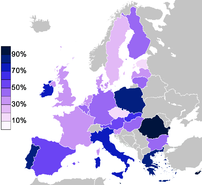[print_link]
EC4333, Economics of European Integration
Module Outline, Autumn 2008
Lecturer Dr. Stephen Kinsella
stephen.kinsella@ul.ie, office hours by appointment only.
TA Neal Kilbane
neal.kilbane@ul.ie, office hours TBA.
Prerequisites EC4001, EC4002, or permission of the instructor.
ECTS Credits: 6
Introduction The years since 1945 have been the longest period since 113 B.C. in which no army has crossed the Rhine with war-like intentions. The very idea of war between the European Union’s member States seems so remote as to be nonsensical. The creation of the European Union (EU); a legal, political, economic, cultural, and soon to be military entity, is one of the greatest economic experiments in the history of Mankind. The shape and scope of the EU has the capacity to affect the lives of hundreds of millions of people in different ways, some positive, some negative. Thus a careful study of this experiment is in order.
This module is about using economics to understand the history of the EU, its significance in terms of the post 1945 World Economy, its development up to today, and the prospects for change most likely in the future. We have 24 contact hours. Each 2 hour block will be thematic, that is to say, this is not a survey module in International Economics or naive Trade theory. Rather, this module will focus on developing the appropriate models and conceptual frameworks to understand a particular issue facing the EU today. The objective of the module is to inform potential future policy makers of the issues at stake and equip them with the tools to analyze these issues.
Learning Outcomes By the end of this module, students should be
1. conversant with the historical literature on the development of the EU having written several thousand words on the subject;
2. understand transaction-cost analysis, institutional analysis, optimal currency area theory and simple models of capital and labour market integration and be able to apply these theories to current practice following the problem sets given in class;
3. conversant with the Solow model of economic growth, theory and practice of covergence, and able to assess the empirical reality of these claims;
4. knowledgeable about EU social and environmental policy and their impact on the Irish economy.
Click below to read the details of this module.

